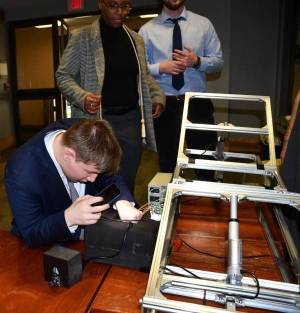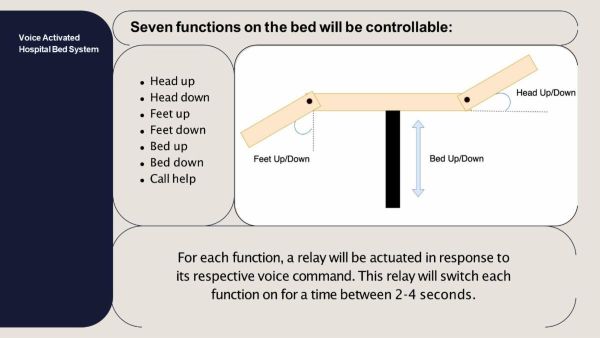VME Capstone Team Loyola 2025

VME is always looking for innovative ways to incorporate the latest technology to better design engineered devices for our clients with disabilities. That is why we were pleased when Capstone Team Loyola '25, took on a bold move to integrate voice-recognition technology into a hospital device to assist patients with quadriplegia.
Patients with quadriplegia face many challenges when it comes to finding the most comfortable (and medically appropriate) bed position. By using a device controlled by the patient's voice, it enables the patient to have more autonomy with bed comfort. It could also reduce the number of demands on medical staff - a win in many respects for all.
The Team's electronic requirements included:
- Activating 7 bed functions (see pic below)
- Ensuring each voice command will have an expected 2-4 second delay (via the SPDT switch)
- Having actuation adjustable by the user
- Having dual feedback: both visual and audio
- Making sure voice commands could be modified by the user
- Including bi-lingual responds in English and Spanish (this device was specifically designed for patients in Puerto Rico)
- To operate with Wi-Fi
The Team also took into consideration the sizing of the device as well as the need for the device to be close to the patient's face to accept the voice commands. The operating requirements included (up to) 5 Volts with a USB - no larger than 6" X 4" X 3" in size. The actual housing encasement turned out to be 4" X 4" X 3" (within the requirement). (For testing, it's important to note the team built a hospital bed for sizing and proprietary restriction purposes. Also, for safety purposes, guidelines from the FDA Hospital Bed System and Dimensional & Assessment Guidance were used.)

Currently, the device is in Puerto Rico,m being tested by Volunteer Dr. Mauricio Lizama, his team and select patients. We look forward to the results and seeing the future of what's in store for other applications using voice recognition to better serve our clients with disabilities.
Special thanks to Team Loyola (now graduates): Alex Kranov, Amelia Arabe, Chris Sabins, and Madison Rolle.
We also appreciate the fine instruction by: Dr. Suzanne Leilson, Dr. Robert Bailey and Dr. Yanko Kranov.